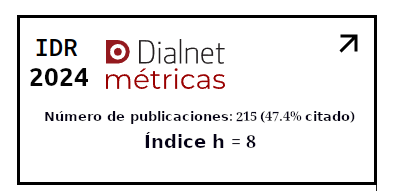Perception level of educational robotics in a Peruvian university
Keywords:
Educational robotics, digital skills, ITCAbstract
The objective of this research work was to analyze the level of knowledge of educational robotics in a Peruvian university. The study corresponds to a quantitative approach and due to its level of depth was descriptive. The non-experimental cross-sectional design was used. The sample was non-probabilistic census type, consisting of 35 teachers from the Academic Department of Education. Information was collected through a questionnaire with content validity through expert judgment and a reliability of 0.89. The data were processed with the Microsoft Excel 2019 spreadsheet and the hypothesis was contrasted with the proportion test with a confidence level of 95%. It is concluded that 97% of teachers do not of the conceptual foundations of educational robotics, while 94% lack knowledge of the pedagogical aspects of educational robotics. On the other hand, 74% of teachers do not have knowledge of the application of educational robotics. These results show a low level of knowledge about educational robotics in teachers.
Downloads
References
Abrate, L. (2020). Formación docente: Revisiones, desafíos y apuestas. Ministerio de Educación de la Nación de Argentina.
Aliaga, I., Carhuaricra, J., Asencios, L., y Piñas, L. (2018). Programa de robótica educativa para mejorar el aprendizaje significativo en estudiantes del cuarto grado del área de Ciencia y Ambiente de la institución educativa San Roque-Castrovireyna 2015. Educa UMCH, (11), 147-161. Recuperado de https://revistas.umch.edu.pe/EducaUMCH/article/view/70
Almahameheed, A., AlShwayat, D., Arias, M., y Pelegrín, J. (2020). Robots in education: A Jordanian University case study. Journal of management and bussines education, 3 (2), 164-180. Recuperado de https://dialnet.unirioja.es/servlet/articulo?codigo=7541166
Astudillo, G., Castro, L., Bast, S., Occelli, M., y Distel, J. (2017). Educación con tecnologías: La Robótica Educativa. Recuperado de http://sedici.unlp.edu.ar/handle/10915/62859
Barrera, N. (2015). Uso de la robótica educativa como estrategia didáctica en el aula. Revista Praxis & Saber, 6 (11), 215-234. doi: https://doi.org/10.19053/22160159.3582
Caballero, Y., Muñoz, A., y García, A. (2019). Learning computational thinking and social skills development in young children through problem solving with educational robotics. In Proceedings of the Seventh International Conference on Technological Ecosystems for Enhancing Multiculturality. TEEM, 19, 19-23. doi: https://dl.acm.org/doi/abs/10.1145/3362789.3362874
Chen, H., Park, H., y Breazeal, C. (2020). Teaching and learning with children: Impact of reciprocal peer learning with a social robot on children’s learning and emotive engagement. Computers & Education, 150, 19-23. doi: https://doi.org/10.1016/j.compedu.2020.103836
Espinoza, F., y Vallejo, L. (2018). Implementación de kits de robótica para mejorar la comprensión científica y tecnológica de los alumnos de educación primaria en la provincia de Coronel Portillo – Ucayali. Tesis de grado. Universidad Autónoma del Perú. Recuperado de http://repositorio.autonoma.edu.pe/handle/AUTONOMA/927
Flores, C., y Roig, R. (2016). Competencia digital docente: Una cuestión clave para la educación del Siglo XXI. Recuperado de https://www.researchgate.net/publication/312295402_COMPETENCIA_DIGITAL_DOCENTE_UNA_CUESTION_CLAVE_PARA_LA_EDUCACION_DEL_SIGLO_XXI
García, A., y Caballero, Y. (2019). Robótica para desarrollar el pensamiento computacional en Educación Infantil. Comunicar, 59 (XXVII), 63-72. Recuperado de https://www.revistacomunicar.com/index.php?contenido=detalles&numero=59&articulo=59-2019-06
García, N., Rivero, M., y Guerra, R. (2020). Brecha digital en tiempos del COVID-19. Revista Educativa Digital, 28, 76-85. Recuperado de https://ruc.udc.es/dspace/handle/2183/26550
González, M., Flores, Y., Muñoz, C. (2021). Panorama de la robótica educativa a favor del aprendizaje. STEAM Revista Eureka sobre Enseñanza y Divulgación de las Ciencias. 18 (2). Recuperado de http://marcalyc.redalyc.org/jatsRepo/920/92065360002/92065360002.pdf
Gorgas, J., Cardiel, N., y Zamorano, J. (2011). Estadística básica. Universidad Complutense de Madrid.
Hernández-Sampieri, R., y Mendoza, C. (2018). Metodología de la investigación. McGraw-Hill.
Morales, P. (2017). La robótica educativa: una oportunidad para la cooperación en las aulas. Recuperado de http://www.enriquesanchezrivas.es/congresotic/archivos/Ens_no_univ/MoralesAlmeida.pdf
Ñaupas, H., Mejía, E., Novoa, E., y Villagómez, A. (2014). Metodología de la investigación cuantitativa-cualitativa y redacción de la tesis. Ediciones de la U.
Piedade, J. (2021). Pre-service and in-service teachers’ interest, knowledge, and self confidence in using educational robotics in learning activities. Revista Educação & Formação. 6, Recuperado de https://revistas.uece.br/index.php/redufor/index
Ramírez, J., y Landín, C. (2017). Modelo de robótica educativa con el robot Darwin mini para desarrollar competencias en estudiantes de licenciatura. RIDE. Revista Iberoamericana para la Investigación y el Desarrollo Educativo, 8(15), 877-897. doi: https://doi.org/10.23913/ride.v8i15.325
Sánchez, T. (2019). La influencia de la motivación y la cooperación del alumnado de primaria con robótica educativa: un estudio de caso. Panorama, 13 (25). Recuperado de https://journal.poligran.edu.co/index.php/panorama/article/view/1132









